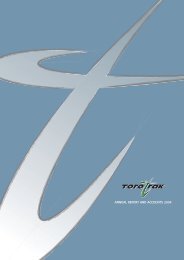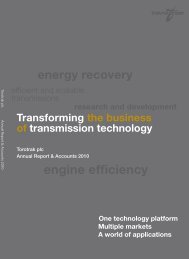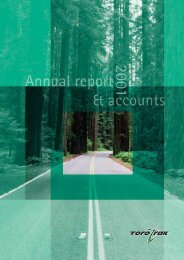Annual report 2007 - Torotrak
Annual report 2007 - Torotrak
Annual report 2007 - Torotrak
You also want an ePaper? Increase the reach of your titles
YUMPU automatically turns print PDFs into web optimized ePapers that Google loves.
Corporate GovernanceThe Board is committed to high standards of corporate governance. The Board considers that it has complied throughoutthe year under review with the principles set out in the revised Combined Code on corporate governance published bythe Financial Reporting Council in July 2003 (the 'Combined Code'), except where indicated below (in relation tomembership of the Audit Committee).The Board and its CompositionBrief biographies of the present Board members are given on page 16 and 17. The Board comprises three executivedirectors, a non-executive chairman and two non-executive directors.The non-executive chairman and non-executive directors are considered by the Board to be independent in character andjudgment and to be free from any business or other relationship or circumstance that could impact such independence.The Company's Articles of Association require that all directors are subject to election by the shareholders at the firstannual general meeting after appointment and thereafter at least once every three years.The Board structure creates a balance such that no individual or small group of individuals can dominate decision making.The roles of Chairman and Chief Executive are clearly separated and have defined responsibilities. The Chairman sets theagenda for board meetings and directs the running of the Board. The Board is supplied in advance of its meetings withappropriate financial, operational and other information to enable the meetings to be effective. The Chief Executive'sresponsibilities focus on managing the Group and implementing board strategy and policy. The non-executive directorshave particular responsibility for the scrutiny of management performance, the review of financial information and theconstructive challenge and development of strategy. In addition, the non-executive directors have particular responsibilityfor the Board committees described below.The Chairman is responsible for the process to ensure that directors keep their skills and knowledge up to date and toencourage their professional development. The Company ensures that adequate time and financial resources are availablefor directors to attend appropriate training. The Directors have direct access to the Company Secretary or, if required,independent professional advice at the Company's expense to be informed on all governance and other matters ofimportance to their Board responsibilities.The Board has reserved specific responsibilities to itself including: setting strategy and approving annual budgets;reviewing financial and operational performance; approving policies for controls and risk management; approving majorcapital expenditure, disposals and major business development; reviewing the health & safety policy and performance ofthe Group; approving patent abandonment; approving appointments to the Board and the position of Company Secretary;approving policies relating to directors' remuneration and the severance of directors’ contracts; and the processes toensure that an appropriate and constructive dialogue takes place with shareholders.Board CommitteesThe Board has delegated specific responsibilities to three committees. Each committee operates within defined terms ofreference set by the Board which are available on request from the Company Secretary. Membership of the committeesis detailed on pages 16 to 17.Audit CommitteeThe Audit Committee (AC) is chaired by David MacKay. Whilst the Smith guidance incorporated into the Combined Codesuggests that the Chairman should not be a member of the Audit Committee, the Board has taken the view that JohnGrant's continued membership since becoming Chairman in the year ended 31 March 2006 is appropriate on the basis ofcontinuity, his significant financial experience and to ensure that there is a quorum in the event of one member beingabsent.The Audit Committee meets at least twice a year prior to the publication of the half year and full year results and at othertimes as the Chairman of the Committee shall require. The Committee considers all matters relating to financial controlsand <strong>report</strong>ing, internal and external audits, risk management policy and procedures, the scope and results of the audits,the independence and objectivity of the auditors and the consideration paid to them. The Board has ultimate responsibilityfor approval.22<strong>Annual</strong> Report and Financial Statement <strong>2007</strong>





